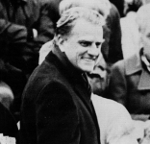The Big Shootout Documentary
On December 6th, 1969, in the wintry landscape of Fayetteville, Arkansas, the Texas Longhorns and Arkansas Razorbacks met in the game of the century. “The Big Shoot Out,” as penned by Texas Coach Darrell Royal, was the brainstorm of television, foreshadowing t.v.’s heavy hand in major sporting events of years to come.
Beano Cook of ABC, after pouring over countless football schedules the previous spring, asked the two perennially dominant teams of the Southwest Conference to postpone their traditional October date to December with the hope of two undefeated teams squaring off on the last Saturday of the 1969 season. The caveat: President Nixon would attend the nationally televised game and crown the winner national champion in celebration of the centennial season of college football.
Coach Royal later observed that "ABC looked smarter than a tree full of owls to postpone that game." Both teams, indeed, came into the game undefeated, ranked one and two in the land. Furthering the hype, and despite their schools' bitter on-field rivalry, Royal and Arkansas Coach Frank Broyles were close friends. “ABC looked smarter than a tree full of owls to postpone that game,” later said Coach Royal.
On December 6th, much to the chagrin of an also undefeated Penn State and its coach Joe Paterno, Nixon boarded Air Force One with a National Championship plaque in hand and headed for Hog country. And oh, the political cast that accompanied Nixon to the Ozarks.
Among the dignitaries on Air Force One: a still relatively unknown Henry Kissinger, also Congressmen John Paul Hammerschmidt and George Bush—both members of the same political party, both pilots and heroes during the war but on opposite sides of the checker board on game day. And consider the presence of Senator William Fullbright, past president of the University of Arkansas and harsh critic of Nixon’s Vietnam policy. Still, both men would temporarily lay down their political arms and enter the Arkansas dressing room together after the game. God was even there, sending Billy Graham to deliver the pre-game invocation.
But it was more than a game just like 1969 was more than just a year. The summer of 69 brought us the moon landing and Woodstock; and some disciples of a fellow named Charles Manson went on a murdering spree. By that fall, war protests were occurring across college campuses with more regularity than Horn and Hog touchdowns combined. Only five days before the “Shoot Out,” the United States implemented its infamous draft lottery causing some youngsters to flee to Canada and Timbuktu and beyond.
One day before kick-off, an Army board conducted an inquiry concerning the murder of 109 South Vietnamese civilians, infamously known as the Mai Lai massacre. That night in Fayetteville, some good ole boys in a pick up shot a black Arkansas student in protest of his protest of the Arkansas band’s tradition of playing Dixie after a Razorback score. Fortunately, the bullet caused little damage and the victim eventually graduated from Arkansas law school and years later would interrogate another Arkansas graduate from that period by the name of Clinton concerning an incident known as Whitewater. Oh yeah, it was the last national championship decided with all white participants. Integration for both teams would leave the bench for the playing field the following year.
During the game, with Secret Service snipers overlooking Nixon’s shoulder, anti-war demonstrators, led by a returning veteran from Vietnam, staked out positions outside the stadium but in full view of the President’s 35 yard line seat. How ironic or perhaps tragically appropriate that one player had already lost a brother in Vietnam.
It was a game for the ages played before a frenetic hog-calling crowd that not only included Nixon and his considerable entourage but also, Colonel Holmes, director of ROTC for the University of Arkansas, and former P. O. W. during World War II. Only months before, at the encouragement of Senator Fullbright, Colonel Holmes assisted that same lad named Clinton delay his draft notice—a decision the Colonel would later come to regret. But on this day, despite a philosophical bridge too wide to cross, the old soldier and future president would root for the Hogs, especially Holmes when his future son-in-law would score the game’s first touchdown.
And finally the game included a courageous performance by a Texas defensive back, as courageous as Colonel Holmes surviving the torture of the Bataan Death March when 18,000 fellow American soldiers did not. It was the most courageous performance ever on a football field. To repeat...ever.
This remarkable documentary provides a glimpse of one of the most fascinating yet tumultuous periods in America’s history. Interviews with TV icon Beano Cook, players, politicians, White House administrators, professor, protesters and coaches—yes, legendary Coach Darrell Royal appears and even fellow legend Arkansas’ Frank Broyles discusses the Shoot Out for the first time—will leave viewers simultaneously longing for the likes of 1969 yet leery of its return.




